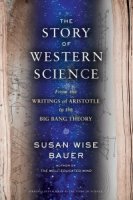 The Story of Western Science: From the writings of Aristotle to the Big Bang Theory by Susan Wise Bauer (W. W. Norton, 2015)
The Story of Western Science: From the writings of Aristotle to the Big Bang Theory by Susan Wise Bauer (W. W. Norton, 2015)
I didn't intend to read this book yet. I had put it on my Amazon wish list with the thought that I might receive it for Christmas. I've barely started Bauer's The History of the Renaissance World (95 by 65 goal number 64), which I felt I should finish before starting another of her books. But then our library purchased the book, and I thought it would be a good idea to skim it and make sure I wanted to keep it on my wish list. I quickly became hooked.
(The book I read had a slightly different title, though apparently the same content. According to Bauer, it "was originally published as The Story of Science, but my publisher has now changed the title to The Story of Western Science." Does that mean they expect a sequel about Eastern science?)
In keeping with the pattern Bauer set with her books of history, this is not so much the history of science as the story of science.
It traces the development of great science writing—the essays and books that have most directly affected and changed the course of scientific investigation. It is intended for the interested and intelligent nonspecialist. It shows science to be a very human pursuit: not an infallible guide to truth, but a deeply personal, sometimes flawed, often misleading, frequently brilliant way of understanding the world.
Each part presents a chronological series of "great books" of science, from the most ancient works of Hippocrates, Aristotle, and Plato, all the way up to the modern works of Richard Dawkins, Stephen Jay Gould, James Gleick, and Walter Alvarez. The chapters provide all of the historical, biographical, and technical information you need to understand the books themselves.
Not that it's necessary to read the books themselves. Bauer's chapters can stand alone to provide a solid introduction not only to the development of science, but to the science itself, on an intelligent but non-technical level. For those who want to dig deeper, Bauer's website provides excerpts from the older and less accessible books. Deeper still? She recommends sources for the originals (translations where necessary) in both print and electronic formats.
Most of us are fed science in news reports, interactive graphs, and sound bites. These may give us a fuzzy and incomplete glimpse of the facts involved, but the ongoing science battles of the twenty-first century show that the facts aren't enough. Decisions that affect stem cell research, global warming, the teaching of evolution in elementary schools—these are being made by voters (or, independently, by their theoretical representatives) who don't actually understand why biologists think stem cells are important, or how environmental scientists came to the conclusion that the earth is warming, or what the Big Bang actually is.
Scientists who grapple with biological origins are still affected by Platonic idealism today; Charles Lyell's nineteenth-century geological theories still influence our understanding of human evolution; quantum theory is still wrestling with Francis Bacon's methods.
To interpret science, we have to know something about its past. We have to continually ask not just "What have we discovered?" but also "Why did we look for it?" In no other way can we begin to grasp why we prize, or disregard, scientific knowledge in the way we do; or be able to distinguish between the promises that science can fulfill and those we should receive with some careful skepticism.
Only then will we begin to understand science.
The Story of Western Science is a solid, intellectual work, but not intimidating. I think our twelve-year-old grandson would enjoy it, and lay a solid foundation for further growth. His nine-year-old brother might even get something from reading through it, though both would benefit from rereading it at a later date. So would I—and I have a degree in mathematics and a stronger background in physics than most.
The book is also a pleasure to read because Susan Wise Bauer writes so well. I do object to her persistent use of the term "different than" instead of "different from," which is a pet peeve of mine—but that's easy to forgive for the overall delight her writing brings. I recommend The Story of Western Science wholeheartedly.
Having read it, however, there's no longer any reason to keep it on my Amazon list—unless, of course, for the sake of those aforementioned grandchildren.
Thank you for this review - I'll put it on our list!


